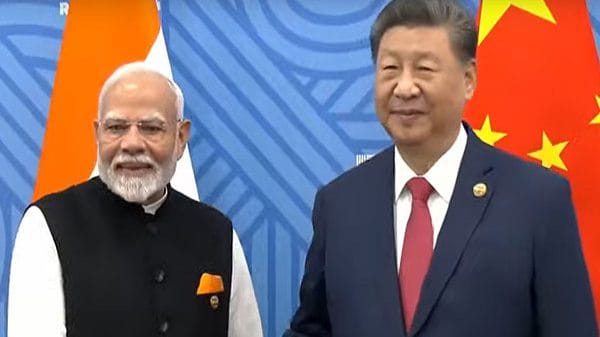India-China relations have moved from a deep freeze to a state of cautious engagement, prompting several commentators to applaud this thaw in relations following the Galwan adventure by Beijing in May 2020. For the first time since 1962, gunshots were reported in and around the Galwan area, violating the historic Border Peace and Tranquility Agreement signed in 1993. Similar to the Panchsheel Agreement of 1954, the BPTA had six solemn declarations to avoid conflict and maintain peace for better relations and trust between the two countries, who incidentally became neighbours after China established total control over Tibet in 1959.
Going by the BPTA, both countries are expected to respect the status quo and the Line of Actual Control (LAC), reduce the risk of confrontation, avoid the use of force, minimise military presence, and initiate confidence-building measures (CBMs). After Beijing decided to junk these agreements in 2020, New Delhi adopted a long wait-and-see approach, which now promises to open a new chapter. The current agreement on patrolling protocol in Eastern Ladakh is just a small part of the larger BPTA. While the BPTA was negotiated after the Sumdorong Chu standoff, the Agreement on Military Confidence-Building Measures signed in 1996 assumes greater significance in the current context.
The recent meeting between Prime Minister Narendra Modi and President Xi Jinping on the sidelines of the 16th BRICS Summit in Kazan, Russia, is a significant step toward creating a conducive atmosphere for resolving conflicts. “Met President Xi Jinping on the sidelines of the Kazan BRICS Summit. India-China relations are important for the people of our countries, and for regional and global peace and stability. Mutual trust, mutual respect, and mutual sensitivity will guide bilateral relations,” PM Modi tweeted.
Also read: India-China LAC issue needs new imagination. It’s too tangled in nationalism now
India-China relations: A history of mistrust
Historically, India-China relations have lacked these three essential elements—mutual trust, respect, and sensitivity. While India began trusting China blindly after Independence, Prime Minister Jawaharlal Nehru got the shock of his life in 1962 when China, after forcibly occupying Tibet, belied the trust and “Hindi-Chini bhai bhai” sentiment by launching a sudden attack on India when Indian defence forces were least prepared and ill-equipped to face a full-scale war. If the attack was sudden, the unilateral withdrawal was equally surprising. The 1962 conflict was followed by clashes in Nathu La and Cho La in 1967. The granting of statehood to Arunachal Pradesh in 1987 led to the Sumdorong Chu standoff, resulting in two significant developments: the 1990 agreement to maintain the status quo and China’s continued claim over areas it refers to as ‘South Tibet.’ This hardly amounts to “mutual trust,” which is expected to form one of the guiding features of bilateral relations between the two countries.
China’s continued disregard for India’s sovereignty claims over Arunachal Pradesh and Jammu & Kashmir is evident in its repeated protests. For instance, after the visit of His Holiness the Dalai Lama to the Tawang Monastery in Arunachal Pradesh in 2017, the Global Times, considered an official mouthpiece of Beijing, editorially ‘warned’ India of a ‘geopolitical onslaught from an economically and militarily stronger China.’ “The invitation to the Dalai Lama by the Indian side to the contested area between China and India will inflict severe damage on the China-India relationship and peace and stability in the China-India border area,” said China’s foreign ministry spokesperson Geng Shuang.
In August 2022, during a UN Security Council meeting convened at China’s request, India’s envoy highlighted China’s duplicity, emphasising that common security can only exist when nations respect each other’s sovereignty and territorial integrity. Beijing’s “salami slicing” tactics in border areas show how China perceives “mutual respect,” while New Delhi continues to pursue peaceful resolutions.
Despite India’s protests, China invests heavily in the China-Pakistan Economic Corridor (CPEC), which passes through Pakistan-occupied Kashmir. It has also blocked efforts by India and the US to designate top Lashkar-e-Taiba (LeT) and Jaish-e-Mohammed (JeM) operatives like Abdul Rehman Makki and Abdul Rauf Azhar as global terrorists under a “technical hold.” After a recent terror attack in Jammu & Kashmir’s Ganderbal, Pakistan-based outfit People’s Anti-Fascist Front lauded the attackers—The Resistance Front, an LeT offshoot—as “strategic,” aimed at disrupting Indian military deployments against “our military interests and those of our Chinese friends.” China is yet to disassociate itself from the terror attack. Supporting terror outfits in Pakistan, which disregard India’s security concerns, is no way of showing “mutual sensitivity” to strengthen bilateral relations.
The current thaw in India-China relations should continue, and lead to greater understanding and respect for India’s security concerns and efforts to normalise relations. For this to happen, the present Chinese leadership must distance itself from Mao’s policy of “armed coexistence.”
The author is the former editor of ‘Organiser’. He tweets @seshadrichari. Views are personal.
(Edited by Prashant)







If i were the PM, i would have signed free trade agreement with China in lieu of receiving lost territories and permanent border settlement.